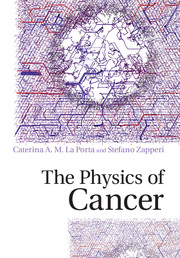Book contents
- Frontmatter
- Dedication
- Contents
- Preface
- 1 Introduction to the Cell
- 2 The Biology of Cancer
- 3 A Modeling Toolbox for Cancer Growth
- 4 Vascular Hydrodynamics and Tumor Angiogenesis
- 5 Cancer Stem Cells and the Population Dynamics of Tumors
- 6 Biomechanics of Cancer
- 7 Cancer Cell Migration
- 8 Chromosome and Chromatin Dynamics in Cancer
- 9 Control of Tumor Growth by the Immune System
- 10 Pharmacological Approaches: Old and New
- 11 Outlook on the Physics of Cancer: A New Interdisciplinary Area
- References
- Index
11 - Outlook on the Physics of Cancer: A New Interdisciplinary Area
Published online by Cambridge University Press: 04 May 2017
- Frontmatter
- Dedication
- Contents
- Preface
- 1 Introduction to the Cell
- 2 The Biology of Cancer
- 3 A Modeling Toolbox for Cancer Growth
- 4 Vascular Hydrodynamics and Tumor Angiogenesis
- 5 Cancer Stem Cells and the Population Dynamics of Tumors
- 6 Biomechanics of Cancer
- 7 Cancer Cell Migration
- 8 Chromosome and Chromatin Dynamics in Cancer
- 9 Control of Tumor Growth by the Immune System
- 10 Pharmacological Approaches: Old and New
- 11 Outlook on the Physics of Cancer: A New Interdisciplinary Area
- References
- Index
Summary
In this book, we have tried to define the expanding boundaries of the relatively new field of the physics of cancer. Traditionally, physicists have contributed to cancer research mostly through the development of novel diagnostic and imaging tools. Things started to change in the last few years when physicists became more and more involved in trying to understand the roots of cancer and its development, bringing to the field their experience with quantitative modeling and data analysis. The basic idea is that cellular processes should ultimately obey the laws of physics: cell migration or mitosis occurs thanks to physical forces; tumors grow into tissues and are thus subject to mechanical and hydrodynamic forces. To understand these issues one needs to perform quantitative measurements and develop theoretical models as physicists have been doing for centuries.
In the last few years, cancer research witnessed the emergence of several promising new avenues deserving further investigation. Biology is currently undergoing a real revolution brought by the sheer growth of readily available quantitative data on all kind of biological processes in general and on cancer in particular. A considerable international effort is currently underway to assemble large databases of genetic mutations, transcriptomes and miRNA for all kinds of tumors from hundreds or sometimes thousands of patients. The ultimate goal of these efforts is to pave the way to a new type of personalized or precision medicine in which treatment will be tailored to the specific genetic and epigenetic features of each patient. Traditional training in biology is, however, often insufficient to deal with the mathematical and computational complexity associated with big data, which are instead the bread-and-butter of physicists. So while these big projects are not driven by physics, many of the people involved were trained in physics.
While genetic, transcriptomic, proteomic and metabolomic data are steadily accumulating in public databases, their interpretation is still a pressing challenge. The first problem stems from the fact that often data in different experiments are recorded using various methods with differences in normalization, formatting and notation. Hence it is often hard to treat and compare different data sets at the same time.
- Type
- Chapter
- Information
- The Physics of Cancer , pp. 138 - 140Publisher: Cambridge University PressPrint publication year: 2017



